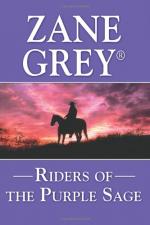Sunset came, bringing with the end of her labor a patient calmness and power to wait that had not been hers earlier in the day. She expected Judkins, but he did not appear. Her house was always quiet; to-night, however, it seemed unusually so. At supper her women served her with a silent assiduity; it spoke what their sealed lips could not utter—the sympathy of Mormon women. Jerd came to her with the key of the great door of the stone stable, and to make his daily report about the horses. One of his daily duties was to give Black Star and Night and the other racers a ten-mile run. This day it had been omitted, and the boy grew confused in explanations that she had not asked for. She did inquire if he would return on the morrow, and Jerd, in mingled surprise and relief, assured her he would always work for her. Jane missed the rattle and trot, canter and gallop of the incoming riders on the hard trails. Dusk shaded the grove where she walked; the birds ceased singing; the wind sighed through the leaves of the cottonwoods, and the running water murmured down its stone-bedded channel. The glimmering of the first star was like the peace and beauty of the night. Her faith welled up in her heart and said that all would soon be right in her little world. She pictured Venters about his lonely camp-fire sitting between his faithful dogs. She prayed for his safety, for the success of his undertaking.
Early the next morning one of Jane’s women brought in word that Judkins wished to speak to her. She hurried out, and in her surprise to see him armed with rifle and revolver, she forgot her intention to inquire about his wound.
“Judkins! Those guns? You never carried guns.”
“It’s high time, Miss Withersteen,” he replied. “Will you come into the grove? It ain’t jest exactly safe for me to be seen here.”
She walked with him into the shade of the cottonwoods.
“What do you mean?”
“Miss Withersteen, I went to my mother’s house last night. While there, some one knocked, an’ a man asked for me. I went to the door. He wore a mask. He said I’d better not ride any more for Jane Withersteen. His voice was hoarse an’ strange, disguised I reckon, like his face. He said no more, an’ ran off in the dark.”
“Did you know who he was?” asked Jane, in a low voice.
“Yes.”
Jane did not ask to know; she did not want to know; she feared to know. All her calmness fled at a single thought
“Thet’s why I’m packin’ guns,” went on Judkins. “For I’ll never quit ridin’ for you, Miss Withersteen, till you let me go.”
“Judkins, do you want to leave me?”
“Do I look thet way? Give me a hoss—a fast hoss, an’ send me out on the sage.”
“Oh, thank you, Judkins! You’re more faithful than my own people. I ought not accept your loyalty—you might suffer more through it. But what in the world can I do? My head whirls. The wrong to Venters—the stolen herd—these masks, threats, this coil in the dark! I can’t understand! But I feel something dark and terrible closing in around me.”




